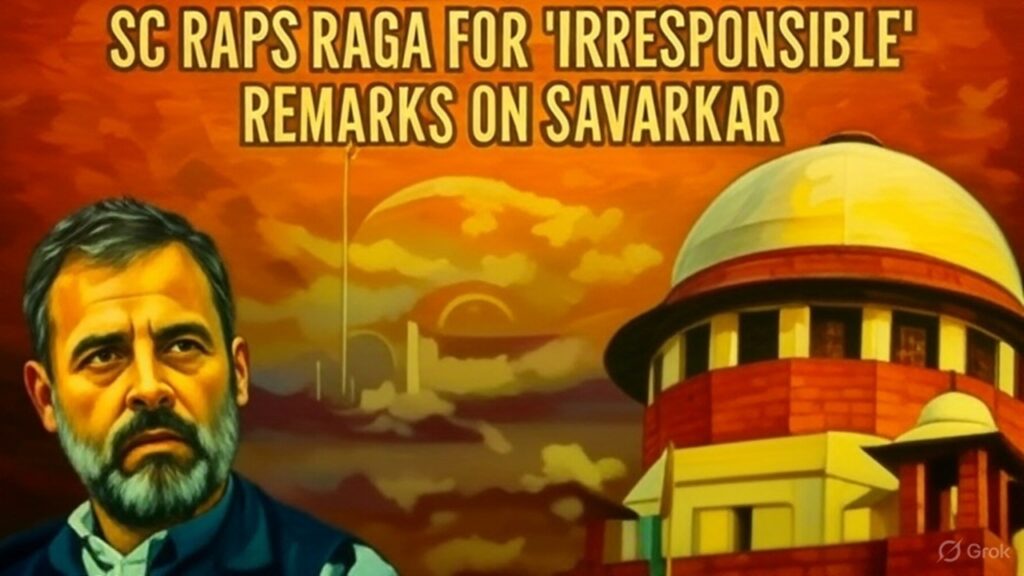OPINION: The Temple Without a Soul: The Supreme Court’s Selective Awakening
By Special Correspondent
The Supreme Court of India, often hailed as the “guardian of the Constitution,” stands tall as a symbol of justice and integrity. Yet, there are moments when its grandeur seems hollow, when its famed impartiality appears to dance to political tunes. From the alleged mountain of cash at Justice Verma’s residence to the glorification of Nathuram Godse by ruling party leaders, serious questions arise: When does the Court’s “suo motu” conscience awaken? And when does it conveniently doze off?
Justice Verma and the Hidden Treasure: The Forgotten Scandal
When reports emerged of a massive cache of cash allegedly discovered at the residence of Justice Ashok Verma, the judiciary’s reaction was startlingly muted. Despite the Chhattisgarh High Court mentioning a fresh case against him in the notorious Naan scam, the Supreme Court — otherwise quick to sermonize on corruption — maintained an uneasy silence.
No suo motu cognizance, no fiery declarations from the pulpit of justice. One wonders: does the Court’s moral compass spin only when a cow is tied on the road, or when a government criticizes the establishment?
Nehru, Gandhi, Ambedkar — And the BJP’s Selective Amnesia
Nehru, Gandhi, Ambedkar — And the BJP’s Selective Amnesia
The BJP and its allies have often launched vitriolic attacks on the legacies of Jawaharlal Nehru, Mahatma Gandhi, and Dr. B.R. Ambedkar — architects of India’s democracy.
- Blaming Nehru: Narendra Modi and his colleagues have routinely blamed Nehru for the partition and the Kashmir conflict, glorifying Sardar Patel at Nehru’s expense.
- Insulting Gandhi: BJP MP Sakshi Maharaj praised Gandhi’s assassin, Nathuram Godse, labeling him a “patriot.” Recently, ex-judge Abhijit Gangopadhyay, now in BJP, endorsed Godse’s rationale.
- Diminishing Ambedkar: While paying lip service to Ambedkar’s legacy, the Sangh Parivar has persistently undermined his philosophy of social justice, notably by introducing economic reservations that dilute the essence of his vision.
Yet, the Supreme Court’s suo motu sensor remained blissfully inactive. Was the court’s radar jammed, or was it simply tuned to a different frequency?
Suo Motu for the Few: The Court’s Strange Priorities
Curiously, the court’s suo motu interventions seem remarkably selective:
- When Rahul Gandhi critiqued Savarkar, the court promptly declared, “Disrespect towards freedom fighters will not be tolerated!”
- But when Gandhi was vilified, when Nehru was called “the culprit of partition,” or when temples for Godse were proposed — the court found no constitutional insult worth addressing.
Selective outrage, after all, is also a form of injustice.
Books That Glorify a Murderer: Where Was the Outrage?
Godse’s book Why I Killed Gandhi continues to sell freely. Discussions on building a temple in his honor have openly flourished.
Was this not a desecration of the ideals India was founded upon?
Yet, the Supreme Court remained aloof, perhaps deciding that Gandhi’s murder was too old a wound to bleed over anymore — unless, of course, the bleeding served a political purpose.
The Missing Soul of the Judicial Temple
The Supreme Court, majestic in architecture but hollow in action, risks becoming a grand building that houses only marble idols, not living principles.
If the dignity of freedom fighters must be defended, then it must be defended for all, regardless of who hurls the insult — be it Rahul Gandhi or Sakshi Maharaj.
And if allegations of corruption within the judiciary itself surface, then the house must be cleansed from within, before preaching morality to the nation.
Without this, the “temple of justice” will remain no more than a façade: imposing, revered, but soulless.


